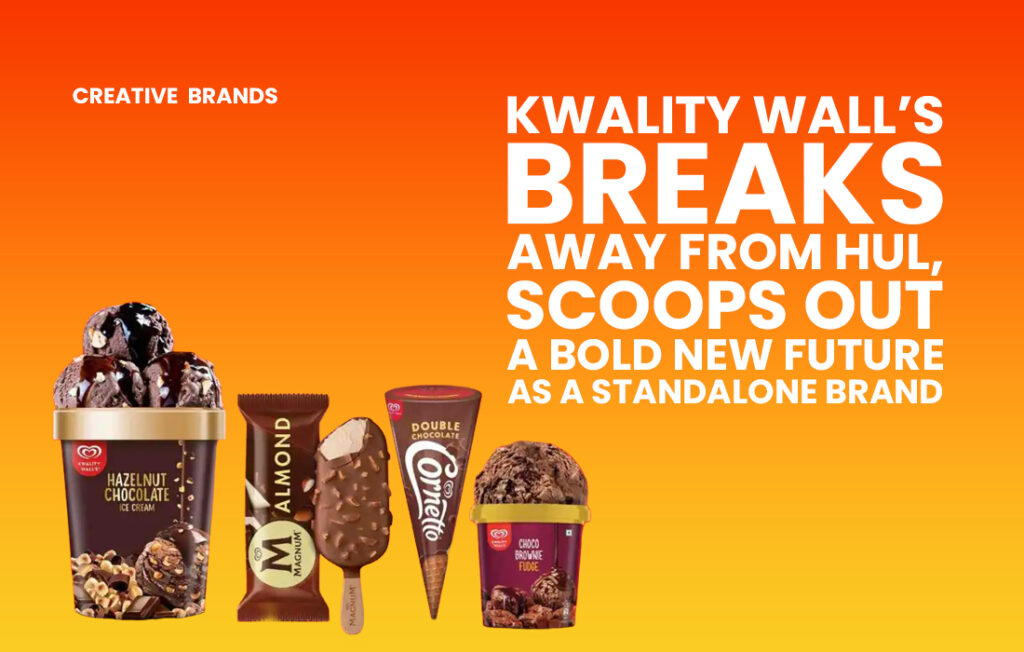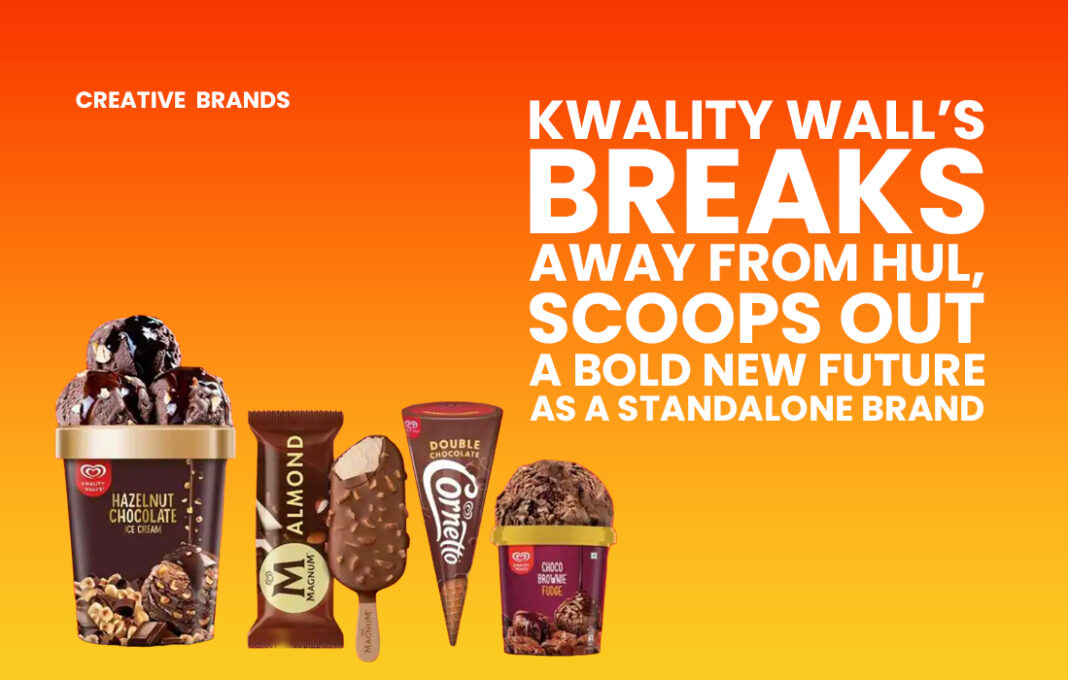Kwality Wall’s is entering a transformative new era as it demerges from Hindustan Unilever and unveils a fresh board to drive its independent future. Rooted in heritage but focused on innovation, the iconic ice-cream brand aims to tap India’s booming snacking economy with a sharper, more agile standalone identity.

For millions of Indians, the familiar red-and-white heart of Kwality Wall’s is more than a logo. It is the after-school reward from childhood, the chilled break on a sweltering holiday afternoon, the memory of pushcarts ringing through narrow lanes and neon freezers glowing outside neighbourhood stores. Few brands have so effortlessly woven themselves into India’s cultural fabric. And now, that very brand is preparing for its most dramatic transformation in decades—one that promises to redefine not just its own future but the arc of India’s fast-rising frozen-dessert economy.
As Kwality Wall’s (India) moves toward a historic demerger from Hindustan Unilever, it steps beyond the shadow of a corporate parent that nurtured its growth for years. In its place emerges a bold standalone vision, complete with a newly unveiled board and an ambition that fuses deep heritage with modern innovation. For a company this embedded in Indian memory, the move is as symbolic as it is strategic: Kwality Wall’s is reclaiming its identity.
The demerger, still fresh in public conversations, is the culmination of a global restructuring at Unilever. But in the Indian market, the timing feels more synchronised with cultural energy than corporate calendars. India’s snacking landscape is booming, fuelled by rising disposable incomes, expanding cold-chain infrastructure, and the ease of ordering ice-cream from doorstep-delivery apps. Frozen treats are no longer a seasonal whim; they are a thriving, year-round category. If there was ever a moment for the brand to stand independently and shape this momentum, this is it.
Behind the scenes, the fresh board announced for Kwality Wall’s (India) indicates a company not just ready for an operational reboot but also for a philosophical one. The new leadership slate reads like a list of specialists hand-picked for the next era of food innovation and business agility. With a new Deputy Managing Director and Executive Director in Chitrank Goel and a fresh CFO and Executive Director in Prashant Premrajka, the company is signalling that financial discipline, sharper focus and faster decision-making will define its new life. Alongside them come seasoned independent directors bringing experience in governance, consumer markets, and risk—voices crucial for a legacy brand preparing to run as a nimble, transparent public company.
For years, Kwality Wall’s was a modest piece of the vast HUL portfolio, a performer but not the star attraction. Today, the narrative has flipped. The demerger positions the ice-cream business as an entity with its own storyline, strategy and speed. Industry observers say that such a move allows a heritage brand to finally compete like a startup—responsively, creatively, and without the constraints of being one among dozens of categories.
The heart of the standalone vision lies in balancing nostalgia with reinvention. Kwality Wall’s has always been strong on the former. Its products evoke emotions that advertising budgets cannot buy. But sentiment cannot carry a company into the next decade. Innovation will. With India’s consumers increasingly adventurous—seeking new textures, flavours, formats and experiences—the brand is expected to sharpen its R&D focus, experiment more freely, and explore ice-cream not just as a product but as a lifestyle category. Think plant-based indulgences, healthier variants, playful collaborations, limited-edition drops, experiential store formats, and perhaps even entirely new snacking verticals.
The significance of this shift cannot be measured in numbers alone. Culturally, ice-cream has transitioned from a treat to a social ritual. Scoops accompany first dates, late-night drives, celebrations and comfort moments. Digital platforms have amplified this ritual through endless content—from aesthetic dessert reels to home-chef experiments—which in turn shapes consumer aspirations. Kwality Wall’s, with its mass reach and trusted reputation, enters this cultural space with an unmatched advantage. As a standalone company, it can move closer to the pulse of this evolving culture.
At the same time, the company’s deep distribution roots—built across decades of ice-cream carts, kiosks, parlours, and freezer placements—form the backbone of its competitive edge. In India, distribution is destiny. And Kwality Wall’s has a network that competitors have long envied. With greater independence, it could amplify this system, modernise it with digital tools, and extend it into markets where demand is rising fastest—Tier 2 and Tier 3 towns where aspirational consumption is exploding and cold-chain access is catching up.
The leadership transition also comes with high expectations. Running an ice-cream company as a separate listed entity demands granular focus on seasonality, capital-intensity, freezer management, and hyperlocal supply dynamics—challenges different from mainstream FMCG businesses. The new board’s diversity in finance, risk and market operations suggests that the company is preparing for these realities with seriousness. For investors, this is reassuring. For customers, it signals that quality, consistency, and innovation will likely see renewed emphasis.
Perhaps the most intriguing aspect of this moment is what it means for Indian brand storytelling. Kwality Wall’s has always straddled an interesting creative identity—nostalgic yet modern, familiar yet aspirational. The demerger could open the door for bolder narratives. As a standalone company, Kwality Wall’s may lean more into its Indian heritage while building a distinctly future-facing brand voice. Expect campaigns that tap into culture, creativity, and emotion with new energy. From flavour launches to digital experiences, the brand could embrace daring ideas in a way that large conglomerates often hesitate to.
But any transformation comes with its share of questions. Will Kwality Wall’s maintain the trust that generations of Indians have placed in it? Will its innovation engine keep pace with global trends? Will it stay accessible while pushing premium boundaries? Can a brand so deeply linked to nostalgia reinvent itself without losing its emotional core?
These are not challenges as much as opportunities. Kwality Wall’s is at the kind of crossroads where legacy brands either fade into comfort zones or reawaken stronger and more relevant. If early signals are any indication, the company seems determined to choose the latter path.
As India’s snacking economy expands rapidly—with younger consumers at the forefront—Kwality Wall’s finds itself with the rare advantage of being both a memory and a possibility. Few brands can claim that duality. Fewer still can leverage it to create a new market narrative.
What emerges, then, is a story not of separation but of rebirth. The demerger from Hindustan Unilever is not the end of an era; it is the beginning of one. Kwality Wall’s (India) is stepping into independence with generations of goodwill behind it, a modern leadership guiding it, and a marketplace more ready than ever for its evolution.
In its new standalone avatar, the brand is no longer just India’s favourite ice-cream. It is a symbol of how heritage can reinvent itself for the future—one scoop, one bite, and one bold decision at a time.
Discover more from Creative Brands
Subscribe to get the latest posts sent to your email.






